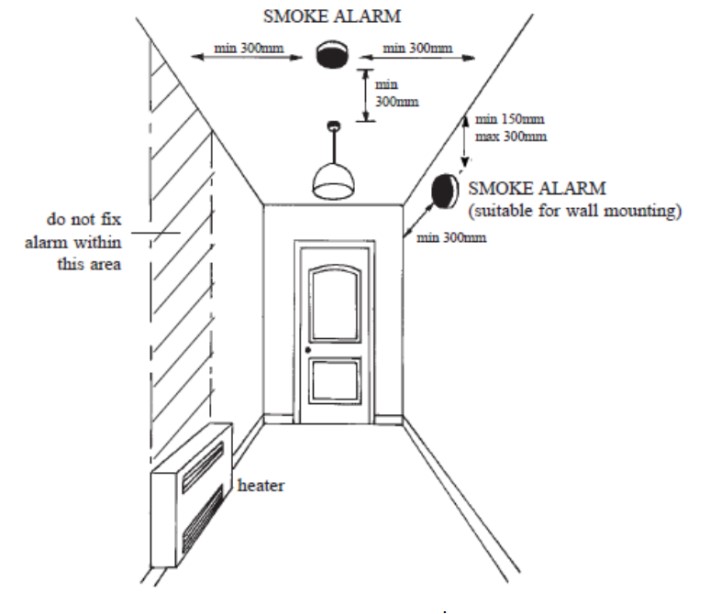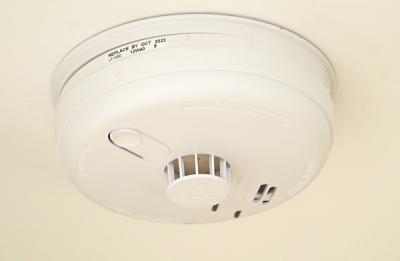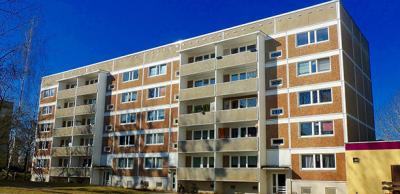Where to install smoke alarms and heat alarms
Smoke alarms have been a standard feature in new homes since they were first introduced into Approved Document B in 1992. Whilst they are now installed as a matter of course, just how much consideration is given to ensuring that they are located correctly?
Siting alarms correctly throughout a property is vital to ensure they provide lifesaving detection and respond as quickly as possible in the event of a fire. Every property is different, but here are some basic rules to follow.
Placing of smoke alarms and heat alarms
- Alarms should be sited on the ceiling, as centrally as possible within the room/area they are installed

- Site 300mm away from walls and light fittings – this is to ensure that they are away from any ‘dead air’ spaces that occur in corners and spaces where the airflow may be blocked
- There should be an alarm within 3m of every bedroom door to ensure audibility
- There should be an alarm within 7.5m of every habitable room
- Alarms should be positioned between high risk rooms and bedrooms
- Alarms should not be sited within bathrooms or too close to a bathroom door as steam/moisture can affect them
- Ceiling-mounted detectors should be located such that their sensitive elements are between 25mm and 150mm below the ceiling in the case of heat detectors, or between 25mm and 600mm below the ceiling in the case of smoke detectors
- Be fixed where they can be reached to maintain, therefore not over the stairs
- Not placed above heaters or air conditioning units/vents
- Where the stairs are open to the rooms at ground floor including the kitchen a heat detector is required in the kitchen
Other factors to consider
- On stairways site alarms on the flat ceilings between the rooms and stairs at each level – do not site on the sloped ceiling directly above the stairs
- Peaked and sloped ceilings – for smoke alarms site a maximum of 600mm vertically down from the apex, for heat alarms a maximum of 150mm vertically down from the apex
- Beams (where the depth of the beam is less than 10% of the room height) – site the alarm twice the depth of the beam or 500mm away from the beam, whichever is less
- Beams (where the depth of the beam is more than 10% of the room height) – treat the beam as a wall and fit alarms on both sides of the beam, or if the beam is less than 600mm deep site an alarm on the underside of the beam
NB Click the image above to download a bigger version.
Further information
The dos and don'ts of mains powered smoke alarms and battery alarms
Please Note: Every care was taken to ensure the information was correct at the time of publication. Any written guidance provided does not replace the user’s professional judgement. It is the responsibility of the dutyholder or person carrying out the work to ensure compliance with relevant building regulations or applicable technical standards.
This article was updated on 22 March 2022
Sign up to the building bulletin newsletter
Over 48,000 construction professionals have already signed up for the LABC Building Bulletin.
Join them and receive useful tips, practical technical information and industry news by email once every 6 weeks.
Subscribe to the Building Bulletin




Comments
Smoke alarm panel positioning
Submitted 1 year 4 months ago
LABC Response
Submitted 1 year 2 months ago
The fire alarm panel would need to be in an agreed location, this would need to be assessed in your application to the Local Authority for Building Regulations in consultation with the Local Fire and Rescue Service who would consider the Listed Building status. Therefore, we would advise that you contact your Local Authority.
Best,
LABC Team
Heat alarm installation
Submitted 1 year 1 month ago
Do we still need one?
And if so, do we need one elsewhere? And if so, where do they need to be placed and which ones can be battery-powered, which ones mains-powered?
The information is so confusing.
Many thanks!
LABC Response
Submitted 1 year 1 month ago
Thank you for your enquiry, however, the answer will be dependent upon your particular circumstances, and this is not something that LABC can help with.
Please discuss the details of your proposals with your professional advisors and contact the Building Control team at your Local Authority to discuss project specific requirements.
Best,
LABC Team
Heat alarms
Submitted 1 year ago
LABC Response
Submitted 12 months ago
Best,
LABC Team
Add new comment